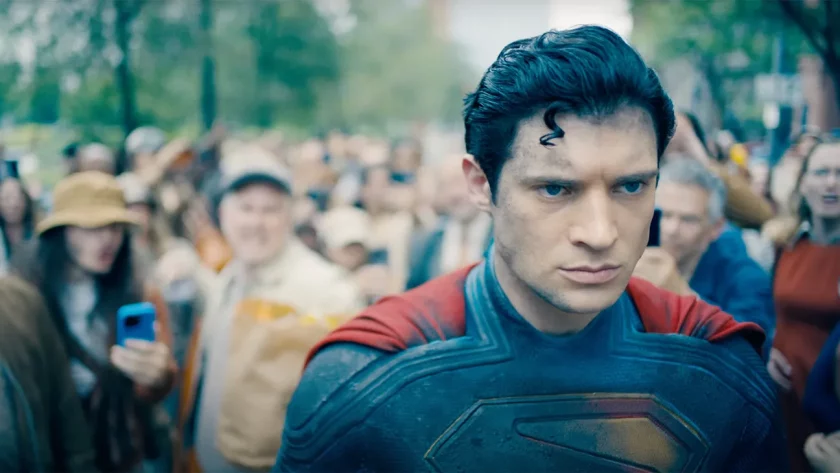In a conversation about James Gunn’s Superman, one could sit and talk plenty about pacing issues and under-rendered CGI all day – take down as many half stars on Letterboxd as it takes to assuage the pedantic heart of an inner film-critic. That would, however, disregard the broader implications of the bold moves made by a film with the weight of an entire franchise on its shoulders for a myopic criticism of something that does not, in fact, operate in the same fashion as any new release. So what exactly distinguishes this take on the poster-child of DC (and perhaps the superhero genre as a whole) from every other failed reinvention that has manifested in the 21st century?
The era of the brooding superhero-film seems to have been ushered in by post-9/11 cynicism around government authority and rising political instability in the West, and christened by Christopher Nolan’s The Dark Knight Rises, a take on the caped-crusader that was grounded in reality and not lacking its requisite dreariness. Audiences saw their anger and grievances reflected in those flawed vigilantes taking on crime in a world just as broken as they were. That reality would have spared no room for the earnest kindness exhibited by this new Superman, a striking departure from his predecessor, Zack Snyder’s Man of Steel.
While superhero-fatigue has become a common term within the vernacular of film discourse in the past half-decade, there can perhaps be a proposed sub-genre of exhaustion around the consistent popularity in the representation of the edgy Superman knockoff, the ‘what if superheroes were real’ satirisation of legacy characters as malicious celebrities, either impassively vicious or retrofit with the hackneyed Deadpool sense of humour that Ryan Reynolds has yet to atone for. Apart from Snyder’s Man of Steel, common perpetrators in this trend include Homelander of The Boys, Omni-Man from Invincible, Brightburn, and Ikaris from The Eternals; and while some of these characters have made important contributions to the genre and facilitated necessary political discourse, it is safe to say audiences were left weary of watching needless violence inflicted at the hands of over-powered individuals, a too close reflection of current realities to allow for anything other than further hopelessness.
Thus, under the resounding synths of John Murphy’s revitalised score, soars in James Gunn’s Superman, a sincere return to form for the character, reigniting his essence as a true beacon of hope rather than a nonchalant wielder of power. This Superman is not a Messiah wrought to assert his dominance over the planet – he is an immigrant orphan, raised by the Kents on a farm as a loving, gentle human being. You will not find this Superman leveling cities; he would rather rescue squirrels from falling buildings and show mercy whilst battling alien creatures. David Corensweth artfully embodies the character with a boyish charm that only furthers Gunn’s vision; his goodwill is not to be confused for naivety, for this Superman enacts justice with a tender embrace instead of an iron fist. This Superman is good – while not lacking nuance, that is a word that had long departed the climes of superhero discussion and has now made a welcome homecoming.
However, the grim actualities of our present are not lost on Gunn. He grounds his Clark Kent in a world that forces him into the classic human struggle of trying to be steadfast in his beliefs as the walls are closing in. The miraculous, unbelievable thing about him? He chooses to be altruistic when he has no reason to be. It is a baffling concept to both the inhabitants of the world on the screen and the world in which we live, that a being so omnipotent, so undeniably god-like, not only refuses to exercise his dominion over “lesser beings,” but relentlessly looks after the little guy. When faced with opprobrium about breaking international law by protecting the people of Jahanpur from the Boravian genocide (an obvious outcry against the Israeli genocide of Palestinians, a commendable artistic declaration from the film), he passionately proclaims “people were going to die!” – that is the only justification that is necessary, that is the exemplar of his resounding empathy, that is his unbreakable resolve. In observing the immediate pressure of the US government for his insubordination, Superman transcends the big screen and into our own reality: forced into the nosebleeds by corrupt systems that take every measure to ensure your helplessness. Here, the magnitude of those systemic injustices is at full display; where it takes cyber-censorship to silence the working-class individual, it takes a manufactured clone to subjugate the likes of Superman.
Where Superman stands for the people, he finds his foil in political machinations and agendas, embodied by Lex Luthor (Nicholas Hoult). Luthor represents everything that fuels oligarchic-capitalist nightmares: the clandestine dealings of powerful authorities for personal gain, the silencing of dissenting voices, the use of technological malpractice to exert dominance over the masses, and every instance when one thinks, “the government wouldn’t do that,” only to follow it with, “oh yes, they would.” He loathes Superman for remaining pure despite his godliness—for having the ability to hold back and not exploit power for personal gain – the defining choice that distinguishes two individuals who both possess Herculean stature in their own right. Luthor is, in turn, a testament to the moralistic creed of Gunn’s Superman: undeterred in his conviction to serve those who most need him. Yet perhaps the idealist superhero’s truest foil is the cynical and tenacious Lois Lane (Rachel Brosnahan). She challenges Clark’s idealism with journalistic skepticism, grounding herself as his equal through determination and intellect—enough to make him gush and crush while she holds him at arm’s length. Their relationship both strengthens Superman’s resolve and affirms the purity of his intention, while simultaneously revealing Clark to be a callow loverboy.
Emerging from an era where irony and criticism have significantly shaped comic-book media, Gunn seeks to usher in a new appreciation for what may well be the next revolutionary approach: sincerity. Reintroducing to audiences the fundamentals of what makes Superman, Superman, this newest film yearns to reinvigorate the traits that were once the bedrock of the character: kindness, humility, and compassion. Ultimately, Gunn reminds us that the secret ingredient is – unironically – love. And perhaps, amid the sobering realities of today, it might just so happen that is exactly what the world has been yearning for.




